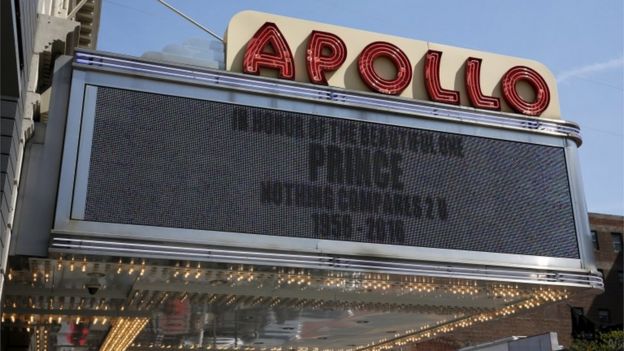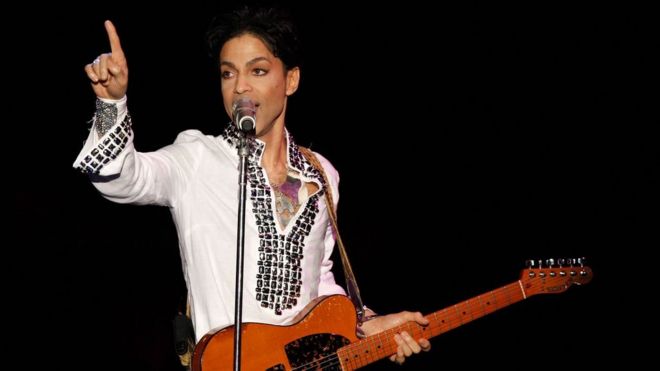I'm numb after seeing this news.

Music
Prince, an Artist Who Defied Genre, Is Dead at 57
By JON PARELES
APRIL 21, 2016

Prince, the songwriter, singer, producer, one-man studio band and consummate showman, died Thursday at his residence, Paisley Park, in Chanhassen, Minn., according to a statement from his publicist, Yvette Noel-Schure. He was 57.
No cause of death has been given. In a statement, the Carver County sheriff, Jim Olson, said that deputies responded to an emergency call at 9:43 a.m.: “When deputies and medical personnel arrived, they found an unresponsive adult male in the elevator. First responders attempted to provide lifesaving CPR, but were unable to revive the victim. He was pronounced deceased at 10:07 a.m.” The sheriff’s office said it would continue to investigate his death.
Last week, responding to news reports that Prince’s plane had made an emergency landing because of a health scare, Ms. Noel-Schure said Prince was “fighting the flu.”
Prince, born Prince Rogers Nelson on June 7, 1958, was a man bursting with music — a wildly prolific songwriter, a virtuoso on guitars, keyboards and drums and a master architect of funk, rock, R&B and pop, even as his music defied genres. In a career that lasted from the late 1970s until an arena tour this year, he was acclaimed as a sex symbol, a musical prodigy and an artist who shaped his career his way, often battling with accepted music-business practices.
“When I first started out in the music industry, I was most concerned with freedom. Freedom to produce, freedom to play all the instruments on my records, freedom to say anything I wanted to,” he said when he was inducted into the Rock and Roll Hall of Fame in 2004. In a tribute to George Harrison that night, Prince went on to play a guitar solo in “While My Guitar Gently Weeps” that left the room floored.
Prince’s Top 10 hits included “Little Red Corvette,” “When Doves Cry,” “Let’s Go Crazy,” “Kiss,” and “The Most Beautiful Girl in the World”; albums like “Dirty Mind,” “1999” and “Sign O’ the Times” were full-length statements. His songs also became hits for others, among them “Nothing Compares 2 U” for Sinead O’Connor and “I Feel for You” for Chaka Khan. With the 1984 film and album “Purple Rain,” Prince told a fictionalized version of his own story: biracial, gifted, spectacularly ambitious. Its music won him an Academy Award and the album sold more than 13 million copies in the United States alone.
Prince was a prolific artist with a career that began in the late 1970s with the release of the album “For You.” He shattered stereotypes on race and sexuality throughout his career.
In a statement, President Obama said, “Few artists have influenced the sound and trajectory of popular music more distinctly, or touched quite so many people with their talent. As one of the most gifted and prolific musicians of our time, Prince did it all. Funk. R&B. Rock and roll. He was a virtuoso instrumentalist, a brilliant bandleader, and an electrifying performer. ‘A strong spirit transcends rules,’ Prince once said — and nobody’s spirit was stronger, bolder, or more creative.”
Prince recorded the great majority of his music entirely on his own, playing every instrument and singing every vocal line. Many of his albums were simply credited, “Produced, arranged, composed and performed by Prince.” Then, performing those songs onstage, he worked as a bandleader in the polished, athletic, ecstatic tradition of James Brown, at once spontaneous and utterly precise, riveting enough to open a Grammy Awards telecast and play the Super Bowl halftime show. Often, Prince would follow a full-tilt arena concert with a late-night club show, pouring out even more music.
In Prince’s biggest hits, he sang passionately, affectionately and playfully about sex and seduction. With deep bedroom eyes and a sly, knowing smile, he was one of pop’s ultimate flirts: a sex symbol devoted to romance and pleasure, not power or machismo. Elsewhere in his catalog were songs that addressed social issues and delved into mysticism and science fiction. He made himself a unifier of dualities — racial, sexual, musical, cultural — teasing at them in songs like “Controversy” and transcending them in his career.
He had plenty of eccentricities: his fondness for the color purple, using “U” for “you” and a drawn eye for “I” long before textspeak, his vigilant policing of his music online, his penchant for releasing huge troves of music at once, his intensely private persona. Yet for musicians and listeners of multiple generations, he was admired well-nigh universally.
Prince’s music had an immediate and lasting influence: among songwriters concocting come-ons, among producers working on dance grooves, among studio experimenters and stage performers. He sang as a soul belter, a rocker, a bluesy ballad singer and a falsetto crooner. His most immediately recognizable (and widely imitated) instrumental style was a particular kind of pinpoint, staccato funk, defined as much by keyboards as by the rhythm section. But that was just one among the many styles he would draw on and blend, from hard rock to psychedelia to electronic music. His music was a cornucopia of ideas: triumphantly, brilliantly kaleidoscopic.
Source






